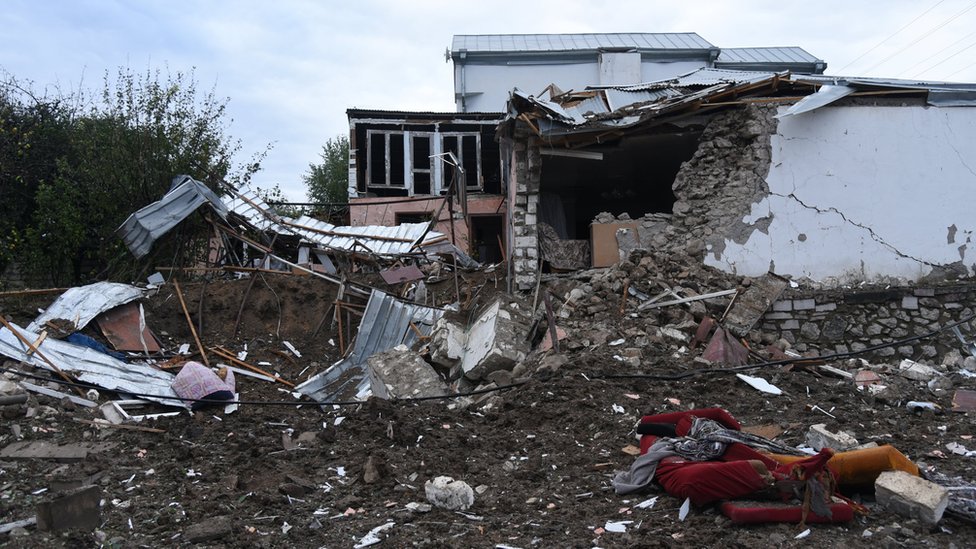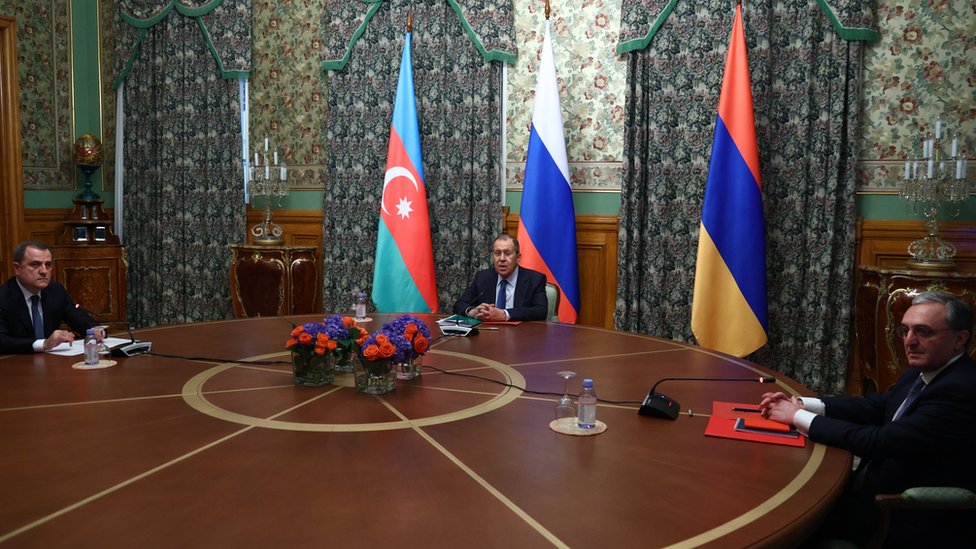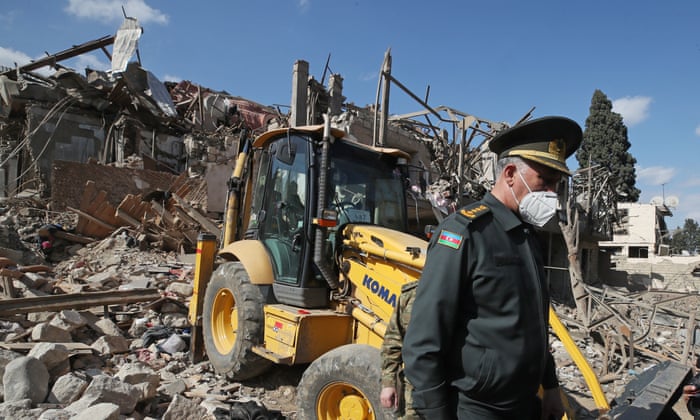Negotiating an End to Conflict in Nagorno-Karabakh
"The final stage of genocide is denial [Turkey's refusal to acknowledge its genocidal war against Armenians in WWI]. By being this aggressive, there's fear that Turkey has ulterior motives in this conflict.""There's now documented evidence that Turkey has been ferrying religious, extremist fighters from Syria into Azerbaijan to fight Armenian forces."Kyle Matthews, executive director, Montreal Institute for Genocide and Human Rights Studies, Concordia University"My message was very clear, that Turkey and all external parties should stay out of the conflict ... we had a firm discussion where I was firm with him [Turkish foreign minister Mevlut Cavusoglu] as to where Canada stands."Canadian Minister of Foreign Affairs Francois-Philippe Champagne
 |
| A house burns after shelling by Azerbaijan's artillery in Stepanakert, the separatist region of Nagorno-Karabakh, late Saturday. (The Associated Press) |
"We are moving towards a truce tonight or tomorrow, but it's still fragile", explained the office of French President Emmanuel Macron on Friday. So fragile, in the light of a response from Azerbaijan's president that it became abundantly clear the 'agreement' was barely that, and it was not destined to last. Turkey, for one does its best to undermine any initiatives to try to lead Azerbaijan away from its war trajectory that emanate from France, the U.S. and Russia.
As far as Recep Tayyip Erdogan is concerned the trio's initiatives to end the conflict were certain to fail. A complete withdrawal of Armenian forces from Nagorno-Karabakh is a primary requirement both he and Azerbaijani leader Ilham Aliyev, demand, before talks leading to a ceasefire can even begin. The two weeks of fighting between Armenian and Azerbaijan forces and the ethnic Armenians in Nagorno-Karabakh has resulted in hundreds of deaths along with civil infrastructure destruction.
 |
| The disputed region has seen two weeks of intense fighting Reuters |
Urging high-level cessation talks between Armenia and Azerbaijan has consumed the efforts of France and Russia and the United States. Those efforts have drawn the haughty contempt of Turkey's Erdogan citing the inability of previous such interventions to solve the problem of the breakaway disputed region which internationally is recognized as Azerbaijan even while Nagorno-Karabakh is in the control of ethnic Armenians representing the majority of the region's population.
Armenians are all too aware that Turkey, which had, under the Ottoman Empire during World War One, engaged in genocidal horrors against Armenians, is once again imperiling Armenian lives. The Azeri President Ilham Aliyev, admitted that following joint military exercises between Turkey and Azerbaijan, Turkish F-16 jets hadremained in his country for weeks. What reason other than for moral and active support for Azerbaijan's planned assault on Nagorno-Karabakh?
Armenia's claims that a Turkish warplane had shot down an Armenian jet, an accusation denied by both Aliyev and Erdogan, certainly have a hook to hang a military cap on. Fighting in the enclave, an ethnically Armenian one with separatist intentions despite the internationally recognized borders of Azerbaijan, flared up at the end of September as the most serious outbreak of violence since 1994 between Azerbaijani troops and ethnic Armenian forces.
 |
| The two countries, mediated by Russian Foreign Minister Sergei Lavrov, took 10 hours to agree to a ceasefire EPA |
The fierce clashes have succeeded in claiming hundreds of lives representing both sides of the conflict. Turkey has positioned itself through Erdogan's political aspirations, as a power broker in the South Caucasus, where Turkey had repeatedly refused to help lead Azerbaijan to truce talks. Russia extended an invitation to the foreign ministers of Armenia and Azerbaijan in a move by Moscow to reassert its influence in he former Soviet republics.
Russia's Vladimir Putin retained a sensible perspective emphasizing the need to negotiate an end to hostilities, a cooling off period during which prisoners could be exchanged and the bodies of fallen troops handed over for burial. Even Canada became involved placing Turkey on notice that it should remove itself from the conflict. Relations between Canada and Turkey are somewhat strained since the export of drone technology to Turkey was suspended, giving Canada the opportunity to look into claims Canadian-produced drones were used by Azeri forces against ethnic Armenian tanks in Nagorno-Karabakh.
 |
| In this image taken from a video provided by ArmNews TV, people carry out an injured man from the Holy Savior Cathedral after the church was shelled by Azerbaijan's artillery outside Stepanakert in the self-proclaimed Republic of Nagorno-Karabakh on Oct. 8, 2020. (ArmNews TV via AP) |
As for Friday night's agreed-to truce, it wore pretty thin fairly quickly with heavy shelling by both sides continuing overnight irrespective of the grudging agreement. An uncomplicated scenario where Azeri shelling hit the enclave and a response from the Armenians ensued. Leaving both sides to insist it was the other who 'started it'. Even as Nikol Pashinyan, Armenia's president states his open attitude to a ceasire, Ilham Aliyev his Azerbaijani leader made it clear he had no intention of backing off until such time as Armenian forces withdrew.
As their two foreign ministers sat down in Moscow for ceasefire talks, Azerbaijaini's Ilham Aliyev condened years of peace talks which failed to yield "an inch of progress", and restated his pledge to continue fighting until his country succeeded in recapturing all of Nagorno-Karabakh. Some of the rural areas that Aliyev claims to have taken are located outside Karabakh itself, and were more or less deserted, their residents streaming into Karabakh for haven from the Azeri forces.
According to Vahram Pohhosyan, speaking for Aravik Harutyunyan, Nagorno-Karabakh's leader, Sunday saw a 'calmer' situation in the precarious truce. The overnight shelling of Stepanakert however, represented “a disrespect of the
agreements reached in Moscow”. The international community, he went on, could put an end to the fighting for good, by recognizing the independence of the province of Nagorno-Karabakh.
 |
| An Azerbaijani officer stands amid the rubble of a residential building destroyed in the fighting in Ganja. Photograph: Valery Sharifulin/TASS |
Labels: Canada, Conflict, France, Nagorno-Karabakh, Negotiations, Russia, Turkey
0 Comments:
Post a Comment
<< Home